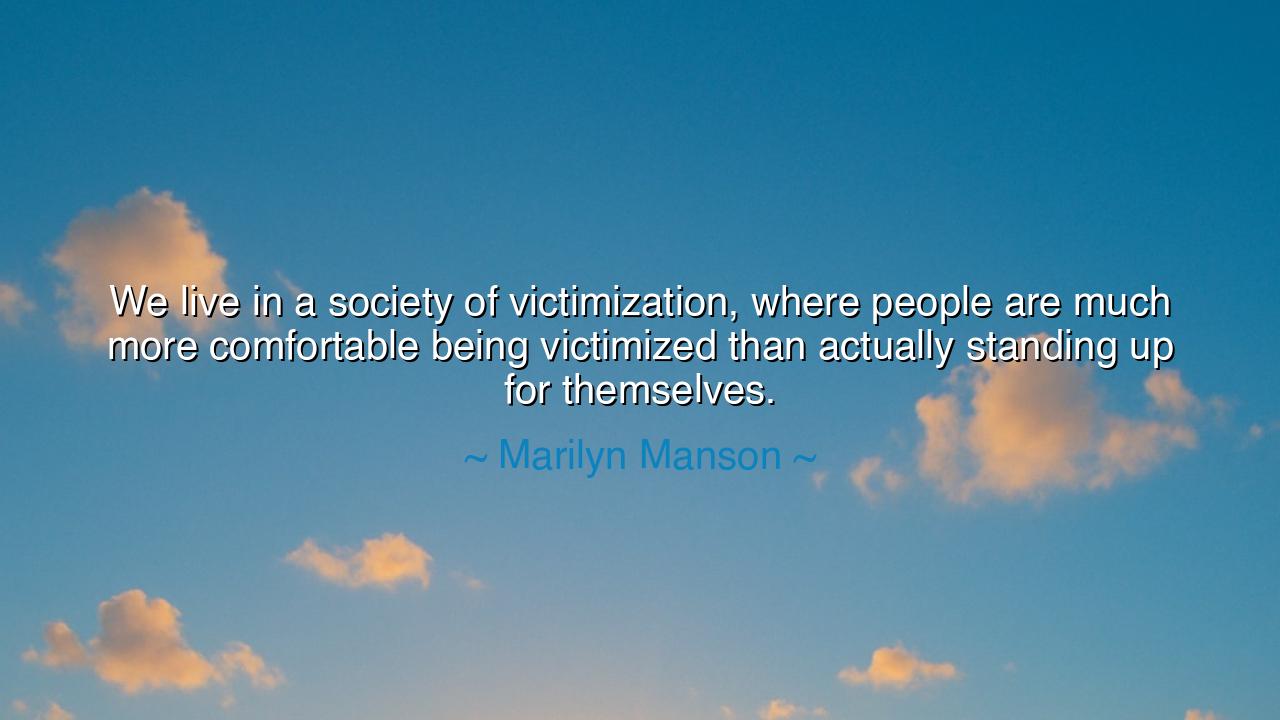
We live in a society of victimization, where people are much more
We live in a society of victimization, where people are much more comfortable being victimized than actually standing up for themselves.






Hear the words of Marilyn Manson, sharp and unsettling as a blade drawn in darkness: “We live in a society of victimization, where people are much more comfortable being victimized than actually standing up for themselves.” These words, though harsh, ring with the tone of prophecy. They accuse our age of weakness—not the weakness of the body, but of the spirit. For in a time when courage is most needed, many find safety in embracing the identity of the victim, rather than in rising to confront their oppressors. It is easier to lament than to resist, easier to submit than to fight.
The meaning of this saying is not to deny that suffering and oppression exist. Indeed, injustice surrounds us on every side, and many are truly wronged. But Manson warns against the temptation of permanence—when the condition of being victimized becomes an identity, a mask worn until it clings to the skin. To accept oneself only as the powerless is to surrender the possibility of transformation. A society that celebrates victimhood above resilience teaches its people not how to break their chains, but how to wear them with pride.
The ancients knew this danger. In Rome, the plebeians were long oppressed by the patricians. But rather than remaining forever in complaint, they rose in the Secession of the Plebs, withdrawing their labor, their service, and their presence until justice was granted. Had they accepted only the role of the oppressed, they would have remained voiceless. But by standing up, they transformed their destiny. Their story is the counterpoint to Manson’s warning: a people who accept victimization without resistance are devoured, but those who claim their strength change the fate of nations.
Consider also the tale of Frederick Douglass. Born into slavery, he knew victimization in its most brutal form. Yet he refused to let it define him. He taught himself to read, he escaped his chains, and he raised his voice until it shook the halls of power. Douglass did not deny his suffering, but he refused to be limited by it. He stood up for himself, and in doing so, he stood for millions. His life shows us the truth hidden in Manson’s words: that liberation begins not with lament, but with courage.
And yet, how often do we see in our time the opposite? A man wronged by life chooses to dwell forever in grievance. A people insulted by injustice cling to the insult, repeating it endlessly, until the insult becomes their whole identity. Thus, bitterness is mistaken for strength, and complaint for power. But true strength is not in rehearsing the wound, but in rising beyond it. To live only as the victim is to give the oppressor a victory that endures long after the chains are gone.
The lesson is fierce but vital: suffering is real, but surrender is chosen. To reject the spirit of victimization is not to deny pain, but to refuse to be ruled by it. It is to recognize injustice, yet answer it not with endless complaint, but with action, courage, and dignity. The one who stands up for himself begins the work of transformation, and in doing so, inspires others to rise. Thus, the path of honor lies not in comfort, but in the struggle for strength.
What, then, must we do? Acknowledge wrongs, but do not make them the center of your being. Speak of injustice, but do not bow to it. Stand up where others fall silent, resist where others submit. Teach your children resilience, not fragility; courage, not perpetual grievance. For a society that feeds only on victimization will wither, but one that feeds on courage will endure.
Thus remember: you are not only what has been done to you—you are what you choose to do in return. Marilyn Manson’s words, though unsettling, are a challenge: to rise from the comfort of being victimized, and to reclaim the power of standing tall. For in the end, the measure of a people is not how much they have suffered, but how bravely they have stood against the forces that sought to break them.






AAdministratorAdministrator
Welcome, honored guests. Please leave a comment, we will respond soon